Millions of Indians have voted in the first phase of the world’s largest elections as Prime Minister Narendra Modi seeks a third term on the back of issues such as growth, welfare and Hindu nationalism.
The vote pits Modi’s Bharatiya Janata Party (BJP) against an alliance of two dozen opposition parties that promise greater affirmative action and more handouts while stressing what they call the need to save democratic institutions.
Before polls closed on Friday, the Election Commission said voter turnout ranged from 40 percent in the sprawling northern state of Bihar to 68 percent in the small northeastern state of Tripura. In the multiphase 2019 polls, the average turnout was 67 percent.
“I urge all those voting … to exercise their franchise in record numbers,” Modi posted on the social media platform X before voting began.
The main opposition Indian National Congress party urged voters to end “hatred and injustice” in a statement on X.
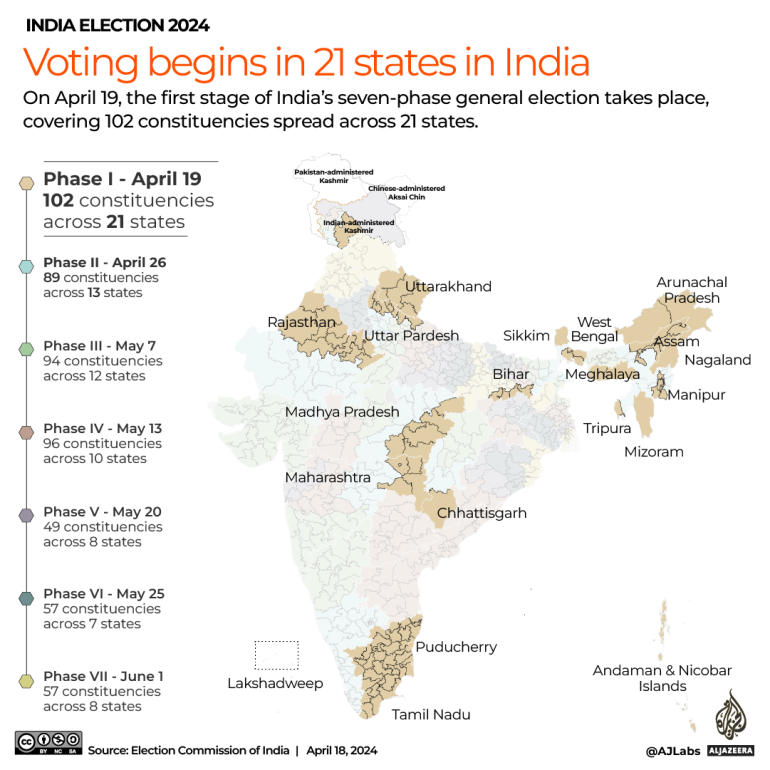
About 969 million people have registered to vote in the six-week elections, including 18 million first-time voters and 197 million who are in their 20s. This makes India’s electorate bigger than the combined population of the 27 European Union member states.
Winding queues of voters
Friday’s vote was the first of seven phases, and it covered 102 constituencies across 21 states and territories from Tamil Nadu in the south to Arunachal Pradesh on the Himalayan frontier with China. Voters in the violence-hit northeastern state of Manipur also turned out in large numbers to vote in the shadow of ethnic clashes that have killed at least 220 people in the past year.
Voters patiently assembled in a long and winding queue outside a polling station in the Hindu holy city of Haridwar in Uttarakhand state on the banks of the Ganges River before the booths opened.
“I am here because I am happy about the direction the country is headed,” autorickshaw driver Ganga Singh, 27, told journalists. “I will vote, keeping in mind not personal welfare but the country’s prosperity.”
Voting took place through electronic voting machines. Voters pressed the blue button corresponding to the serial number, name and symbol of the candidate of their choice or chose the option “none of the above”.
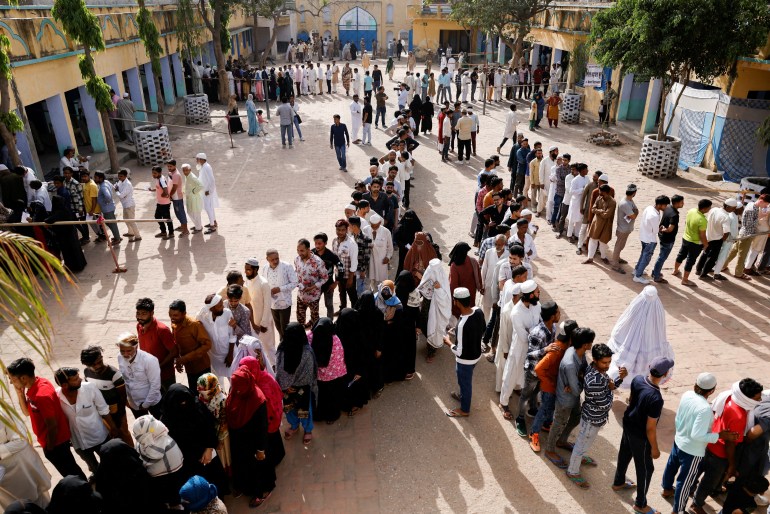
While the voting process was generally peaceful, in Manipur, voting was soon disrupted over allegations of irregularities, Indian media reported. A paramilitary security officer in Bijapur district of the central state of Chhattisgarh was also injured in an “accidental” explosion, reports quoting the police said.
Modi vs the opposition
Surveys suggested the BJP will easily win a majority in the Indian Parliament even though voters are worried about unemployment, inflation and rural distress.
Jobs were the chief concern for Mohammed Shabbir, a Muslim voter in Kairana in the northern state of Uttar Pradesh. None of his eight children has regular employment, the 60-year-old driver said.
“Even the Hindus are affected by a lack of jobs,” he told the Reuters news agency, insisting that the problem outweighs the appeal of Hindu nationalism in the Hindu-majority nation.
In Tamil Nadu, where the BJP is weak, voters seemed divided on whether Modi’s strong push this time around would benefit his party.
“The BJP may not boost its vote share in Tamil Nadu, but nationwide, Modi will win hands down again,” S Rajagopal, a three-wheeled taxi driver in the state capital, Chennai, told Reuters.
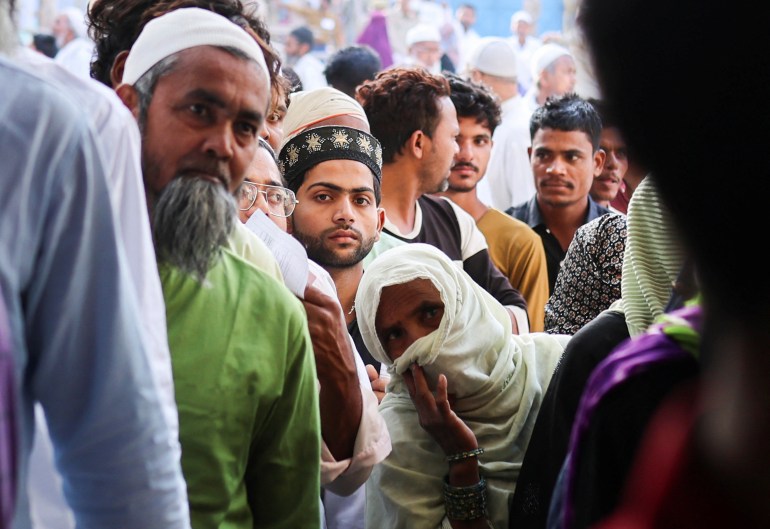
Attacks on minorities, mainly Muslims, since Modi’s rise to power and an alleged gag on free speech and media are also among the issues likely to affect the elections.
Modi’s government has “controlled Muslims”, Ramesh Chand, a Hindu biscuit baker in Kairana near Muzaffarnagar, told local media.
BJP confident
BJP spokesman Mohan Krishna expressed confidence that his party would sweep the elections.
“The opposition is in disarray,” he told Al Jazeera.
“The welfare schemes, … a corruptionless government,” led by Modi has given “immense satisfaction as well as confidence to the people.”
Krishna also said allegations of backsliding of democracy under Modi were “absolutely rubbish”.
“Democracy and the constitution are held high by the BJP, and we have proved that … in the last 10 years,” he said.
But some BJP insiders and analysts said the party is worried about complacency or overconfidence among voters and party members and needs to draw more people to vote.
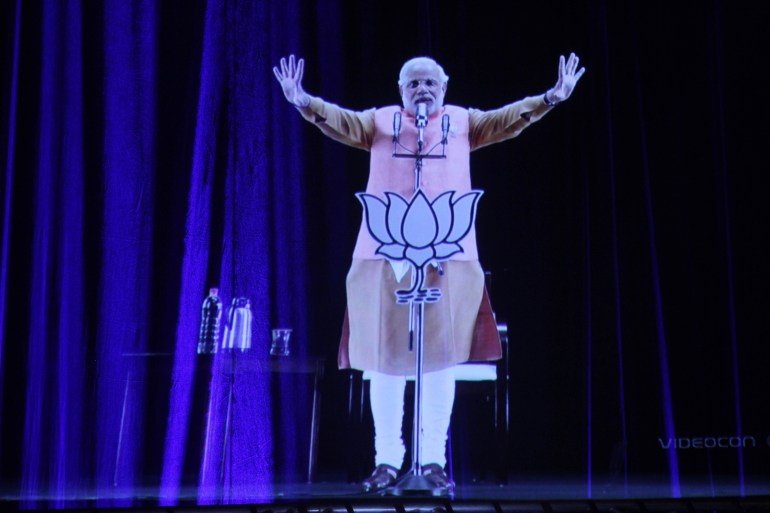
The opposition Indian National Developmental Inclusive Alliance (INDIA), to which the Congress party belongs, has criticised the BJP for rising unemployment and corruption while also challenging the government’s statements on inflation data.
“The opposition’s manifesto has laid stress on unemployment, on women’s emancipation, for the farmers ensuring a minimum support price and also our essential plank of social justice, which is inclusive growth – something that the BJP has not done,” Congress spokesperson Anshul Avijit told Al Jazeera.
Yet the INDIA alliance has struggled to forge unity. It has accused the government of hobbling its efforts by arresting its leaders in graft cases and issuing huge tax bills to its parties before the vote – a charge the government denies.
Avijit said the opposition believes in the power of democracy and the people of India, who he said would rise up against the ruling party, which he said had undermined India’s electoral system.
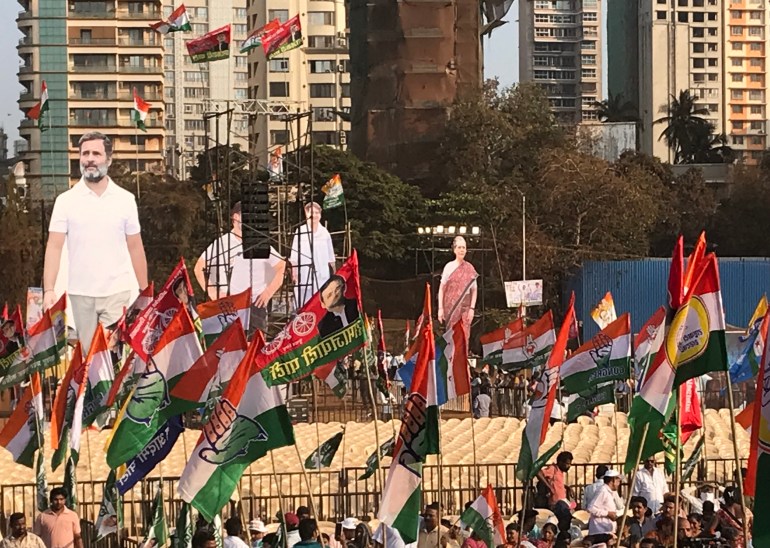
The second phase of the marathon election will be held on April 26 with 89 parliamentary seats up for grabs in 13 states.
The following phase of voting will take place on May 7 for 94 seats in 12 states. On May 13, 96 seats in 10 states will be decided while on May 20 voters will cast ballots for 49 seats in eight states.
The May 25 phase will cover 57 seats in seven states, and the last phase on June 1 will see polling in 57 constituencies across eight states.